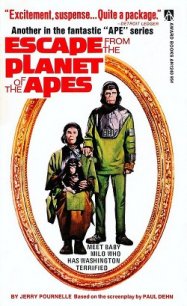Conquest of the Planet of the Apes - Jakes John (читать книги онлайн полностью txt) 📗
All at once the wheels bounced over a bump, throwing the apes off balance. They squealed as they floundered. Then they goggled at the one among them still upright: Caesar, who had merely reached out to grasp a bar for support.
Despite these pathetic creatures being his brothers, Caesar couldn’t help the flash of contempt that crossed his face. The apes, cowering grotesquely on the reeking, offal-littered straw of the cage, showed that they knew a superior being had come into their midst.
Caesar’s presence calmed—or cowed—the other apes in the cage. There were no further disturbances for the remainder of the trip.
He speculated about the van’s destination. Whatever it might be, he was probably better off than he would have been roaming the hostile, unfamiliar city. He worried about Senor Armando, though. Surely his failure to return was due strictly to some unexpected entanglement with the authorities. Surely no harm had come to him . . . No, at this moment he was probably free again, waiting for the service tunnels to clear. With all the shocks and horrors of the past twenty-four hours, any other possibility was too grim for Caesar to contemplate.
His excellent time sense told him the journey lasted about half an hour. Evidently they were driving into the thinly populated green spaces surrounding the metro complex. He recalled Armando telling him that, once, such areas had sprawled with ugly row houses and huge shopping malls. But with the rise of powerful centralized government, strictly enforced law and order had been restored to the cities, and a rebuilding process had begun in the decayed central cores.
Gradually, a reverse migration took place. Mile after mile of emptied suburban slums were leveled, and returned to parklands and agriculture. City dwellers now called such exurban areas “the provinces.”
Caesar’s keen nose caught the scent of greenery and sweet earth. The sight of the crystal stars reminded him of more pleasant times in the circus—
But this brief sense of security disappeared the instant the van reached its destination.
Oval lamps whipped past overhead. The glares and flashes started the other apes gibbering and snorting again.
Then the van drove down an incline. Caesar would have tumbled against the others if he hadn’t gripped the bars tightly.
Abruptly the van braked, went into reverse, stopped again. Over the top of the side panel Caesar could see only a giant concrete pylon, half in shadow, and the faint glow of distant lights. Then he heard men’s voices, and a motor’s low purr.
The rear gate of the van, which he couldn’t see, opened with a clang. The motor revved, the cage jerked upward slightly, then began to travel horizontally.
As it cleared the back of the van, riding the prongs of a forklift, Caesar saw men in white smocks peering up at the new arrivals. He managed to get a reasonable picture of his new surroundings. The van had arrived in a vast truck bay underneath what appeared to be a large building. Each corner of the concrete expanse overhead was supported by one of those giant pylons rising from shrub plantings at ground level, about eight feet up from the floor of the bay.
The forklift rolled past the front of the van. As the driver leaned out of the cab to hand a delivery ticket to one of the white-smocked men, a female voice blared over a loudspeaker. “Shipment five-oh-seven I-for-Indonesia ex Borneo now arriving at number two gate.”
The voice and the acceleration of the lift truck started the orangutans gibbering and salivating again. Caesar made a few such noises himself, deeming it protective action. By pressing close to the bars, he was able to see the loading dock toward which the forklift was rolling. The white-smocked men below were following the vehicle. Caesar noted with alarm that the men carried short whips, leashes, and those metallic prodding devices he’d observed in the city. To his left, looking out onto the dock, he saw communications operators behind a large window set into a wall. Above the window a glowing sign read: Ape Management Facility 10—Reception.
In that large room behind the window, lights winked on banks of equipment, messengers arrived and departed, and three women bent over microphones, monitoring the arrivals outside. Caesar heard another amplified voice: “Shipment five-oh-nine A-for-Africa ex French Cameroons now arriving at number four gate.”
The forklift bumped the edge of the dock, lowered the cage, began to withdraw its supporting prongs. Wild barkings and snarlings started on the right, further along the dock. There, other handlers were ramming prods into another noisy cage that had been similarly deposited.
“All right,” someone said outside Caesar’s cage. “Open it.”
The bolts snicked. Handlers crowded around, faces tense. Caesar blinked at the men, feigned fearful docility. He was startled to hear one of the handlers exclaim, “For God’s sake! I didn’t know we were getting a chimp in this load.”
The speaker reached into the cage, seized Caesar’s arm, jerked him outside. He was shoved across the concrete dock and in through a steel door that rolled swiftly aside. The handler followed, metal prod held waist high.
Behind him, Caesar heard the cracking of whips, interspersed with an occasional yelp from the apes being hauled out of the cage one by one.
Caesar stopped just inside the entrance of a large, bare chamber. Its left wall was glass, looking into the communications center he’d seen from outside. As his handler shoved him again, the loudspeaker boomed: “After fingerprinting, shipment five-oh-seven I-for-Indonesia ex Borneo will proceed to Conditioning Cages nine-oh-one and nine-oh-two.”
“We’ll have to use one of the chimp cages too,” said Caesar’s handler to a uniformed official waiting at a table beside a metal gate. “Got a ringer in this load. Who’s on duty from the chimp section?”
“Morris, I think,” said the official. He pressed one of several colored buttons on the table. Caesar noticed two state security policemen standing beyond the gate, surveying the new arrivals. From the adjoining communications center, another operator announced: “Immigration personnel are reminded that, until further notice, State Security has requested one, repeat one, additional copy of all chimpanzee fingerprints for their files.”
The uniformed official looked sour. He grabbed Caesar’s hand, pressed it to an ink pad, then forced the hand down on a square of white card stock. He repeated the operation, passing the second card over the barrier to one of the policemen. The policeman slipped the card into a black briefcase.
Then the official touched another button. The gate opened inward, just as a hefty young man with brown eyes and an immense shock of curly hair appeared from the mouth of a corridor. He carried a prod tucked under his arm.
“Yours, Morris,” said the fingerprint official, shoving Caesar forward through the open gate. The ape’s resentment flared again. But he controlled his temper, still slumped over in excellent imitation of a wild chimpanzee.
Morris, the handler, extended his right hand tentatively. After appropriate hesitation, Caesar reached up to grasp the fingers. Morris smiled.
“He looks like a gentle one,” Morris said, leading Caesar toward the corridor.
“Bastard,” came the good-natured complaint from behind. “You’ve got the easy duty with the chimps—dammit, no!”
Caesar turned briefly to see the orangutans lined up in a ragged queue on the far side of the gate. One was being prodded and whipped for having picked up the ink pad. Caesar was glad to enter the corridor and leave the unpleasant sight behind.
The lighted corridor curved, revealing a long row of steel-barred cages, empty. Morris pressed a control panel in the wall next to the cage identified as Chimpanzees 903.
The electrically controlled door rolled aside. Morris pushed Caesar forward. As soon as he was inside, the barred door shut.



